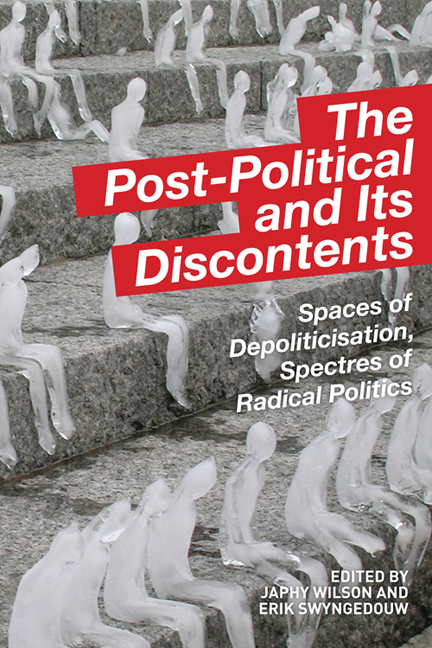Book contents
- Frontmatter
- Contents
- List of Contributors
- Seeds of Dystopia: Post-Politics and the Return of the Political
- Part I Spaces of Depoliticisation
- Part II Spectres of Radical Politics
- 8 Insurgent Architects, Radical Cities and the Promise of the Political
- 9 The Limits of Post-Politics: Rethinking Radical Social Enterprise
- 10 Neither Cosmopolitanism nor Multipolarity: The Political Beyond Global Governmentality
- 11 Against a Speculative Leftism
- 12 Spatialising Politics: Antagonistic Imaginaries of Indignant Squares
- 13 After Post-Politics: Occupation and the Return of Communism
- 14 The Enigma of Revolt: Militant Politics in a ‘Post- Political’ Age
- There Is No Alternative
- Index
10 - Neither Cosmopolitanism nor Multipolarity: The Political Beyond Global Governmentality
from Part II - Spectres of Radical Politics
Published online by Cambridge University Press: 05 August 2016
- Frontmatter
- Contents
- List of Contributors
- Seeds of Dystopia: Post-Politics and the Return of the Political
- Part I Spaces of Depoliticisation
- Part II Spectres of Radical Politics
- 8 Insurgent Architects, Radical Cities and the Promise of the Political
- 9 The Limits of Post-Politics: Rethinking Radical Social Enterprise
- 10 Neither Cosmopolitanism nor Multipolarity: The Political Beyond Global Governmentality
- 11 Against a Speculative Leftism
- 12 Spatialising Politics: Antagonistic Imaginaries of Indignant Squares
- 13 After Post-Politics: Occupation and the Return of Communism
- 14 The Enigma of Revolt: Militant Politics in a ‘Post- Political’ Age
- There Is No Alternative
- Index
Summary
Taking Chantal Mouffe's (2005) discussion of cosmopolitanism and multipolarity as a vantage point, this chapter examines contemporary dynamics of the political and post-political in international relations through an investigation of the global governance projects of the European Union (EU) and the recently constituted BRICS group (Brazil, Russia, India, China, South Africa). Emerging against the background of the unipolar or neo-imperial moment of the United States in early twenty-first-century world politics, EU and BRICS global governance programmes might be seen as important alternatives to recent American visions of world order, which seem to point in rather different directions. Prima facie, the EU's commitment to a post-sovereign world of multilateral cooperation underpinned by globalisation, human rights and the rule of law appears to contrast with BRICS’ call for a multipolar world order based on equal sovereignty. This is reminiscent of the distinction that Mouffe draws between cosmopolitanism and multipolarity. Mouffe criticises cosmopolitan theorists for promoting a post-political vision that simultaneously denies hegemonic and pluralistic dimensions of (world) politics by presuming or promoting an international consensus around liberal democracy, postnational identity, cosmopolitan rights and technocratic global governance. Against this homogenising and depoliticising conception of world politics, Mouffe endorses the agonistic pluralism of a multipolar world order as a preferable alternative. My chapter complicates Mouffe's critique of cosmopolitanism and advocacy of multipolar order by mobilising Foucauldian governmentality analysis and Jacques Ranciere's conception of the political (‘politics’).
In a first move, it deconstructs the opposition between the cosmopolitanism of the EU's approach to external relations and the multipolar global governance project of BRICS by unfolding the EU's ‘governmentality of ambiguity’ (cf. Best 2005, 2008) and BRICS’ ‘bricolage’ of governmentalities. The governmentality analytic confounds Mouffe's cosmopolitan-multipolar binary by highlighting that the EU's ostensibly cosmopolitan (egalitarian, civilian, constitutional, supranational) approach is shot through with hierarchical, military, extra-constitutional and intergovernmental countercurrents, while BRICS’ ostensibly multipolar project also features biopolitical, liberal and neoliberal rationalities of governance. In a second move, the chapter suggests that Ranciere's (1995, 1999, 2010) understanding of politics in terms of ‘dissensus’ and ‘subjectivation’ provides a more productive avenue than Mouffe's multipolar order to make sense of the political (and post-political) in the BRICS-EU dyad. Despite ‘multipolar’ ambiguities, the EU's approach to global governance ultimately embodies a ‘police’ project in Ranciere's sense.
- Type
- Chapter
- Information
- The Post-Political and Its DiscontentsSpaces of Depoliticisation, Spectres of Radical Politics, pp. 208 - 228Publisher: Edinburgh University PressPrint publication year: 2014



